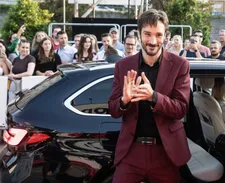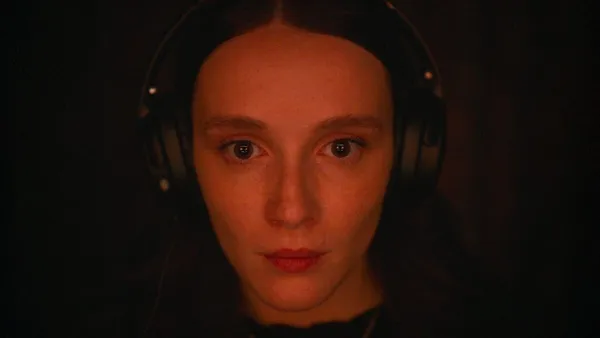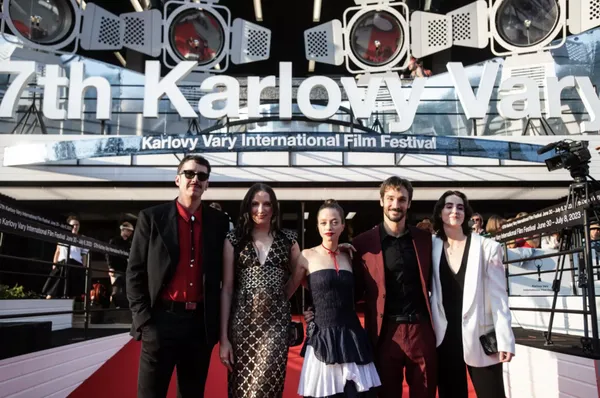According to his research, Red Rooms (Les Chambres rouges) director Pascal Plante has discovered than there are more than 5000 films or series out there listed under the category of “serial killer”.
The Quebec filmmaker - whose feature will open this year's Fantasia Film Festival - believes what he describes as “morbid fascination” with them has reached some kind of peak with the current enduring appeal of true crime series. He suggests his film is part cyber thriller, part courtroom drama, and almost anti the serial killer genre. It focusses on the trial of Ludovico Chevalier (played in a wordless performance by Maxwell McCabe-Lokos) who is accused of murdering teenage girls and then selling the videos of his exploits.
The narrative is viewed mainly through the eyes of Kelly-Anne (played by Juliette Gariépy, a model) who follows the trial obsessively and strikes up a friendship with another girl also hooked by the proceedings.
He is concerned by the fact that an understudied phenomenon indicates that such killers provoke a “magnetic attraction” in some women. Plante cites the revelation that Charles Manson received more than 20,000 letters a year (including some marriage proposals) until his death in 2017.
 |
| Pascal Plante in Karlovy Vary Photo: Film Servis Karlovy Vary |
Attending the Karlovy Vary International Film Festival with his actors, producer and cinematographer Plante has said the phenomenon “haunted me enough to spark my imagination”. He added: “Motivated by pandemic angst, I fell into a murky research rabbit hole that also led me to read about cyber-security and tech crimes. I wanted the fictional killer in this film-in-the-making to be a product of his time: it was only fitting to think about new media to shape his psychopathic profile.”
The idea was to take a closer look at those who are attracted to darkness. “It seems a bit strange that women in particular seem to respond to men with that image. Why? I don’t have an answer,” he said.
If he had to cite any cinematic influences he would suggest David Fincher and Michael Haneke. “I am not into gore films that much. If you have flashes of bright red light then Haneke is a name that comes to mind. I do like the austerity of his films. I do think about violence and its consequences. I prefer more psychological horror films which crawl under your skin and affect you. And, yes, there is a dash of Fincher too. How could you not be inspired by him, but we did not try to imitate him at all.”
Plante who grew up on American cinema and directors such as Quentin Tarantino, and also harbours a soft spot for Trainspotting, opens the fill in a studio-build court-room setting. “The opening statements from the counsel and prosecutor felt like a good way to introduce the story which then becomes labyrinthine and a puzzle. You have all these cards to deal yet as it goes along it becomes more subjective and expressionistic. At the beginning we have no idea who the main protagonist is but she takes the story forward. I wanted it to be cold and procedural and, yes, it is a bit like a documentary.”
He came up with the idea with is producer Dominique Dussault. He had no particular actors in mind but once the characters were created he set off looking for the cast. He was concerned that the actor who played the accused (Maxwell McCabe-Lokos) might have turned it down because he has no dialogue whatsoever and sits silently and menacingly in a glass box “almost as if he is being watched under a microscope”.
Most of the stars, including Juliette Gariépy, are not actors who are household names and have lead roles in major films. “That works to my advantage because Kelly-Anne [Gariépy’s character) is an enigma - and working with a less known actor just adds to the mystery,” he said.
In preparation for this project, he watched many “twisted” films to the point of flirting with “apathy” in the face of extreme images. But horror isn’t just found in fiction: news reports are often just as sordid, he suggests. Plante points out that in her recent writings, critic Susan Sontag said that the relentless flow of violent images in our societies immunises viewers and ultimately undermines their ability to respond; that this daily horror diet ultimately elicits indifference rather than outrage or even compassion.
Based in Montreal, Plante's first narrative feature, a punk romance entitled Fake Tattoos, competed at the Berlinale, in Generation 14plus, in 2018, while his second Nadia, Butterfly was included in the official selection of the 73rd edition of Cannes in 2020. His success suggests that there is a strong vitality in current Quebec cinema. “I believe our voices can be quite distinctive,” he said.























